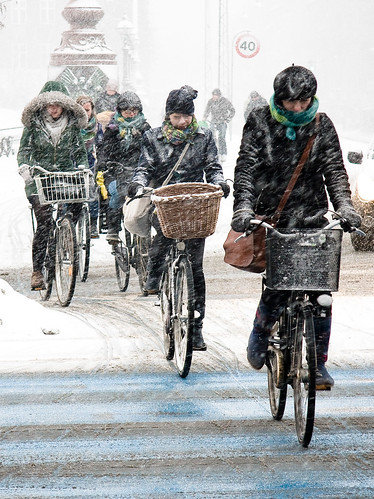How to survive cold winter – useful Polish vocabulary Posted by Kasia on Jan 8, 2015 in Grammar, Nature, Phrases, Vocabulary
Winter ( zima) is back, and it’s colder than ever. Coupled with snow (śnieg), dry air (suche powietrze), sickness (choroba), and everything else that comes with winter, it’s shaping up to be pretty rough. Here are different ways to keep yourself sane during this bleak season.
1. Stay active, even in the cold! Bądź aktywny, nawet na mrozie!
Most of us tend to hole ourselves up in the winter, which means lots more couch potato-ing—especially if you’re used to exercising outside. That means to stay fit and healthy, you should try twice as hard to stay active as you do during the summer. Luckily, you have a lot of options, from running (bieganie) to skiing (jazda na nartach) or even biking (jazda na rowerze). You can even keep exercising when you have a cold, though if your symptoms are below the neck, you should probably take a break:)
2. Drive safely in the snow! Jedź bezpiecznie po śniegu!
Snow may be pretty when it’s falling, but as soon as you have to drive somewhere, it becomes your worst enemy (wróg). Make sure your car is prepared for winter so you avoid any technical issues (problemy/usterki techniczne), then brush up on your winter driving skills. Know which streets are plowed (które ulice są odśnieżone), brake before you turn (zahamuj przed zakrętem), and keep a healthy amount of space between you and the car in front of you. You might want to stock your car with a few useful items too, like cooking spray for frozen doors, or kitty litter in case you get stuck (though floor mats may work in a pinch). Park facing east if you can to defrost your windshield, too.
3. Use your thermostat wisely! Korzystaj mądrze z termostatu!
You may be tempted to crank up the thermostat in the winter, but this can be costly—and unnecessarily so! A programmable (programowalny) thermostat can help a lot, but you can also drop your thermostat gradually to help you get used to slightly colder temperatures. If you’re in a hotel, this trick will help you override the thermostat’s built-in limits, too.
4. Prepare for storms! Przygotuj się do burzy śniegowej!
Every year it seems like there’s another “snowpocalypse” or “stormageddon” that’s going to bury us all until spring, but in reality, it’s usually just a few big snows every year. Still, you should be ready for anything, whether it’s something simple like a cancelled flight (odwołany lot) or something worse like losing power (utrata prądu) or getting snowed in entirely (być zasypanym w śniegu całkowicie). Put together an emergency kit for your home and your car, and keep everything well charged. If you do lose power, you can still stay productive—you just have to prepare for it.
5. Heat yourself instead of the entire house! Ogrzej siebie, zamiast całego domu!
Lastly, remember: heating yourself is more efficient than heating your entire home (especially if you live alone). Prepare your body for winter, seal off any unused rooms (uszczelnij niewykorzystane pokoje), and consider a space heater (grzejnik) to save a little on heating costs. It’s amazing what a good pair of socks or slippers (dobra para skarpetek czy kapci) will do.
Do następnego razu… (Till next time…)

Build vocabulary, practice pronunciation, and more with Transparent Language Online. Available anytime, anywhere, on any device.
About the Author: Kasia
My name is Kasia Scontsas. I grew near Lublin, Poland and moved to Warsaw to study International Business. I have passion for languages: any languages! Currently I live in New Hampshire. I enjoy skiing, kayaking, biking and paddle boarding. My husband speaks a little Polish, but our daughters are fluent in it! I wanted to make sure that they can communicate with their Polish relatives in our native language. Teaching them Polish since they were born was the best thing I could have given them! I have been writing about learning Polish language and culture for Transparent Language’s Polish Blog since 2010.




